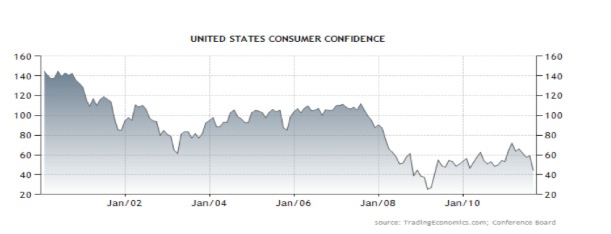An Alternate Diagnosis for Bleak Consumers

Originally published in the Huffington Post in September 2011, this article is just as relevant now, as consumer spending has not yet fully recovered from the Great Recession.
The U.S. consumer society is built on a slew of deeply imbedded cultural norms, from keeping up with the Joneses to the idea that shopping makes you feel better to President George W. Bush’s exhortation after 9/11 that shopping is patriotic. So it is puzzling that, despite the fact that the U.S. has technically been out of a recession since June of 2009, consumer spending continues to lag.
Ben Bernanke addressed this phenomenon in his speech last week in Minneapolis. Part of his explanation for why the recovery has stalled was that “Even taking into account the many financial pressures that Americans face, households seem exceptionally cautious.” He’s right: Based on historical models, people should be spending more. The New York Times‘ Binyamin Appelbaum posits a reason for consumer bleakness: “Americans collectively are suffering from what amounts to an economic version of post-traumatic stress disorder.”
Yes, the economic collapse was a traumatic event. And it’s true that post-traumatic stress disorder (PTSD) can take years to heal. Some never heal. Often the sufferer avoids anything that reminds him of the trauma. In this case, they might not want to spend money for fear of reliving the experience. Or they might numb themselves to ward off the high they used to get from shopping.
My own experience, living in New York when Lehman collapsed, supports the societal PTSD diagnosis. The day after the market fell over 900 points, I passed a workman unloading his truck and heard him call out to a friend “It’s Armageddon” — the same epitaph printed in huge font on the front page of New York’s premier tabloid, The Daily News. I certainly experienced trauma, eventually leaving the city I could no longer afford and closing my business.
But that’s not the reason that, years later, my fellow citizens and I are still not spending. Now, I believe we have to consider another mental state: Recovery from addiction.
My retreat from spending started long after the collapse happened. At first, as many Americans did, I continued to spend as I always had, using borrowed money. Whenever and however we decide to stop, we experience withdrawal symptoms: Anxiety, restlessness, irritability, insomnia, headaches, poor concentration, depression and social isolation. We might “slip” many times during this stage into the old, dangerous behavior, even after we have repudiated it.
An addict recovers finally by separating him or herself from the people, places and things that tempt. I believe our entire culture, now in recovery, is turning away from the lure of spending, substituting activities that are free and people who don’t need to spend to enjoy life. Instead of going out to restaurants with clients, we are cooking at home and eating with family and friends. Malls are emptying and parks and campgrounds are filling up. Some unemployed may not be looking for work anymore because they have found a cheaper way to live that enables them to do more fulfilling work, despite the loss of pay.
Many Americans are souring on the economy, but there is definitely a silver lining. As long as we allow our mental state to be defined in purely economic terms — a “depression” means we are all depressed, a fall in consumer confidence translates to a loss of confidence in ourselves — we ignore important things, like good work and the inspiration of the outdoors.
Yes there are still those who believe every American has an obligation to make as much money as possible. Hopefully, they will evolve before the depression hits them too. Even the metrics are changing: The move to replace Gross Domestic Product as a measure of America’s prosperity with some other non-economic measure has evolved from an impractical dream closer to reality. This January, Forbes ran an article titled The World’s Happiest Countries.
I believe we’re largely over our collective PSTD and deep into our recovery from addiction. The economy might stink, but the future looks bright. To paraphrase the pop song, it used to be about getting what you want, now it’s wanting what you’ve got. And that’s what recovery is all about isn’t it — feeling stimulated without artificial stimulants?
